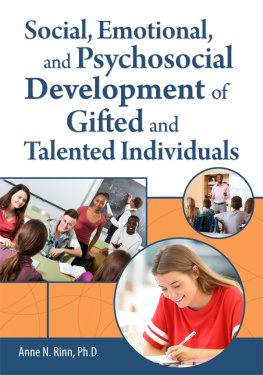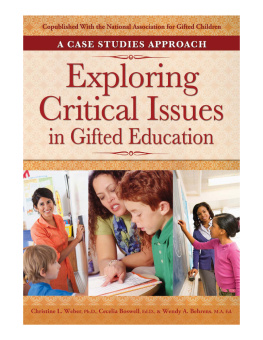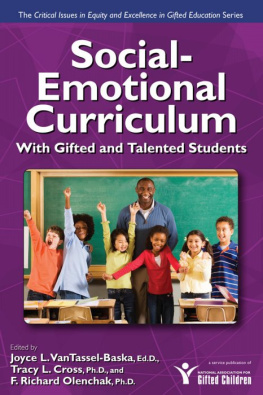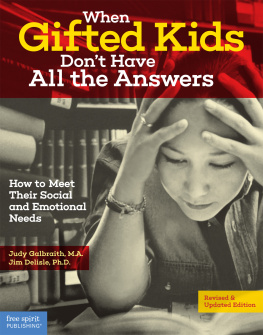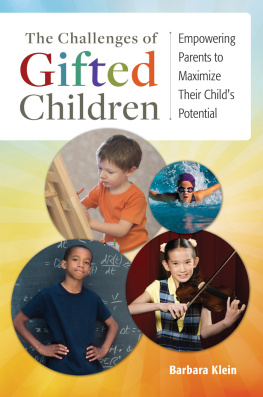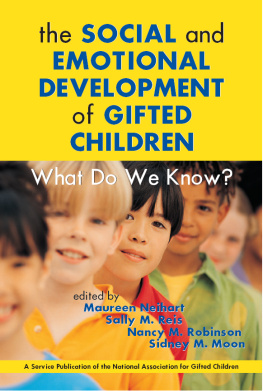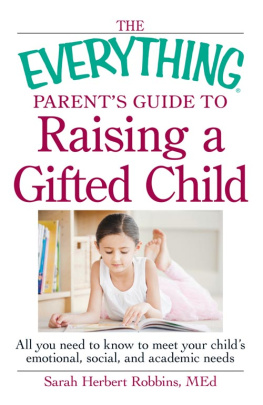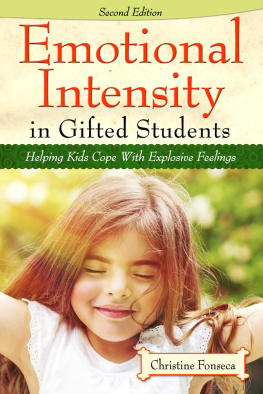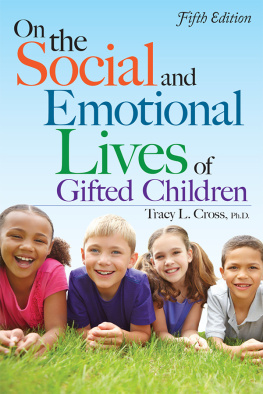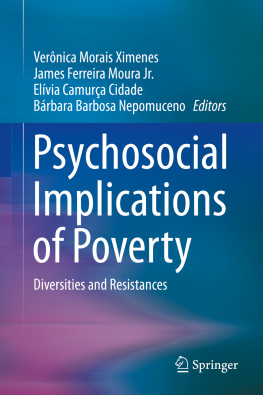Anne N. Rinn - Social, Emotional, and Psychosocial Development of Gifted and Talented Individuals
Here you can read online Anne N. Rinn - Social, Emotional, and Psychosocial Development of Gifted and Talented Individuals full text of the book (entire story) in english for free. Download pdf and epub, get meaning, cover and reviews about this ebook. publisher: Sourcebooks, genre: Children. Description of the work, (preface) as well as reviews are available. Best literature library LitArk.com created for fans of good reading and offers a wide selection of genres:
Romance novel
Science fiction
Adventure
Detective
Science
History
Home and family
Prose
Art
Politics
Computer
Non-fiction
Religion
Business
Children
Humor
Choose a favorite category and find really read worthwhile books. Enjoy immersion in the world of imagination, feel the emotions of the characters or learn something new for yourself, make an fascinating discovery.
- Book:Social, Emotional, and Psychosocial Development of Gifted and Talented Individuals
- Author:
- Publisher:Sourcebooks
- Genre:
- Rating:3 / 5
- Favourites:Add to favourites
- Your mark:
- 60
- 1
- 2
- 3
- 4
- 5
Social, Emotional, and Psychosocial Development of Gifted and Talented Individuals: summary, description and annotation
We offer to read an annotation, description, summary or preface (depends on what the author of the book "Social, Emotional, and Psychosocial Development of Gifted and Talented Individuals" wrote himself). If you haven't found the necessary information about the book — write in the comments, we will try to find it.
Anne N. Rinn: author's other books
Who wrote Social, Emotional, and Psychosocial Development of Gifted and Talented Individuals? Find out the surname, the name of the author of the book and a list of all author's works by series.
Social, Emotional, and Psychosocial Development of Gifted and Talented Individuals — read online for free the complete book (whole text) full work
Below is the text of the book, divided by pages. System saving the place of the last page read, allows you to conveniently read the book "Social, Emotional, and Psychosocial Development of Gifted and Talented Individuals" online for free, without having to search again every time where you left off. Put a bookmark, and you can go to the page where you finished reading at any time.
Font size:
Interval:
Bookmark:
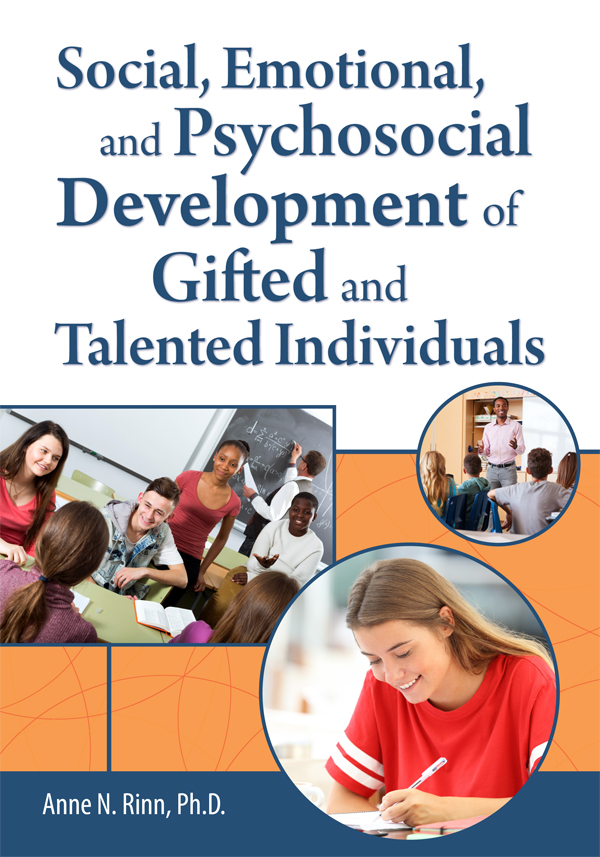


Library of Congress Cataloging-in-Publication Data
Names: Rinn, Anne N., 1978- author.
Title: Social, emotional, and psychosocial development of gifted and talented individuals / Anne N. Rinn.
Description: Waco, TX : Prufrock Press Inc., 2020. | Includes bibliographical references. | Summary: This book merges the fields of individual differences, developmental psychology, and educational psychology with the field of gifted education for a complete overview of the social, emotional, and psychosocial development of gifted and talented individuals-- Provided by publisher.
Identifiers: LCCN 2020014709 (print) | LCCN 2020014710 (ebook) | ISBN 9781646320042 (paperback) | ISBN 9781646320059 (ebook) | ISBN 9781646320066 (epub)
Subjects: LCSH: Gifted persons--Psychology. | Creative ability--Psychological aspects. | Developmental psychology. | Educational psychology.
Classification: LCC BF412 .R43 2020 (print) | LCC BF412 (ebook) | DDC 155.45/5--dc23
LC record available at https://lccn.loc.gov/2020014709
LC ebook record available at https://lccn.loc.gov/2020014710
Copyright 2020, Prufrock Press Inc.
Edited by Stephanie McCauley
Cover design by Micah Benson and layout design by Shelby Charette
ISBN-13: 978-1-64632-006-6
No part of this book may be reproduced, translated, stored in a retrieval system, or transmitted, in any form or by any means, electronic, mechanical, photocopying, microfilming, recording, or otherwise, without written permission from the publisher.
For more information about our copyright policy or to request reprint permissions, visit https://www.prufrock.com/permissions.aspx.
At the time of this books publication, all facts and figures cited are the most current available. All telephone numbers, addresses, and website URLs are accurate and active. All publications, organizations, websites, and other resources exist as described in the book, and all have been verified. The authors and Prufrock Press Inc. make no warranty or guarantee concerning the information and materials given out by organizations or content found at websites, and we are not responsible for any changes that occur after this books publication. If you find an error, please contact Prufrock Press Inc.
| Prufrock Press Inc. |
Dedication
For Dr. Sidney Moon.
Table of Contents
Acknowledgments
Early in my career, in the years just following the completion of my doctorate, I met up with Dr. Sidney Moon after a conference presentation that had just ended at the National Association for Gifted Children annual conference. I had adopted her as one of my mentors a few years prior, and in that meeting we were talking about my future in the field of gifted education. Among many other things, she told me I should write a social and emotional textbook for the field. I laughed and told her I did not think I had anything to say. Her expression never wavered as she looked straight at me and said, One day you will. Well, she was right. Thank you, Dr. Moon, for believing in me.
In the Spring 2018 semester, I had the opportunity to teach a new doctoral seminar on the social, emotional, and psychosocial development of gifted and talented individuals. Knowing I would also be writing this book, the syllabus for that class served as the first draft of the table of contents. I was fortunate to spend an entire semester in deep discussion with my insightful doctoral students on a topic with which I had been absorbed since I was an undergraduate. As a sophomore in college, my first paper in my Honors Introduction to Psychology class was on how self-concept differed between gifted and average-ability individuals. I have learned quite a lot since then, and I learned even more in leading the doctoral seminar in 2018. So, to that end, thank you to the brilliant students in that class: Sam Earls, Kacey Crutchfield, Melanie Meyer, Jessica Ottwein, Noel Jett, Kris Majority, Kay Shurtleff, Mattie Oveross, Kathy Soles, Lindsay Lee, and Sarah Roberts.
Thank you to Dr. Tracy Cross and Dr. Paula Olszewski-Kubilius for reviewing and providing feedback on drafts of a proposal for this book. And, thank you to Dr. Don Ambrose, Dr. David Dai, and Dr. Rena Subotnik for reviewing and providing feedback on drafts of this book. I am so thankful for your time, thoughtfulness, and kindness.
Introduction
Anyone whose chosen field is meant to support the development of unusually intelligent humans needs to begin with an understanding of who he or she is. (Tolan & Piechowski, 2013, p. 8)
Consider for a moment the following scenarios:
 A professional musician is feeling performance anxiety, which is affecting his ability to perform.
A professional musician is feeling performance anxiety, which is affecting his ability to perform.
 A new graduate student feels like she does not belong in her graduate program because everyone else seems so much more accomplished and talented.
A new graduate student feels like she does not belong in her graduate program because everyone else seems so much more accomplished and talented.
 A young gymnast struggles with trading high school social experiences for training for the Olympics.
A young gymnast struggles with trading high school social experiences for training for the Olympics.
 A seventh-grade honors student has seemingly lost all motivation for his schoolwork.
A seventh-grade honors student has seemingly lost all motivation for his schoolwork.
 A second grader newly identified for gifted programming realizes that she is different from her same-age peers but does not understand how or why.
A second grader newly identified for gifted programming realizes that she is different from her same-age peers but does not understand how or why.
What do these individuals have in common? They all exhibit talent within their respective domains (i.e., academics, sport, music). Each of their talents has been recognized by others (e.g., experts in their field, educators). They have each experienced varying degrees of success (this is not to say the second grader is successful because she was identified for a gifted program, but she has done well academically for a couple of years). Yet, they are all experiencing something affecting their ability to reach their potential in their domains of talent that is seemingly unrelated to their actual talents. Reaching ones potential does not just depend on ones abilities, skills, or knowledge within a particular domain; just because a person has the requisite specific abilities and talents to succeed in a domain does not guarantee that they will be successful.
For many years, researchers have examined noncognitive skills and affective factors that contribute to achievement in grades K12, experiences in higher education, and production and performance in the workforce. Researchers have termed these noncognitive skills or affective factors differently over time: work ethic, leadership, emotional intelligence, interpersonal and intrapersonal intelligence, character traits, personality, drive, and psychosocial skills, to name a few (see Kyllonen et al., 2014). When looking at achievement, performance, or success in a domain of talent, noncognitive skills are just as important as domain-specific abilities along the talent development continuum (along with a host of environmental factors). Some even argue that noncognitive skills are more important than domain-specific abilities in the development of talent (e.g., Duckworth, 2016; Goleman, 1995).
Next pageFont size:
Interval:
Bookmark:
Similar books «Social, Emotional, and Psychosocial Development of Gifted and Talented Individuals»
Look at similar books to Social, Emotional, and Psychosocial Development of Gifted and Talented Individuals. We have selected literature similar in name and meaning in the hope of providing readers with more options to find new, interesting, not yet read works.
Discussion, reviews of the book Social, Emotional, and Psychosocial Development of Gifted and Talented Individuals and just readers' own opinions. Leave your comments, write what you think about the work, its meaning or the main characters. Specify what exactly you liked and what you didn't like, and why you think so.

